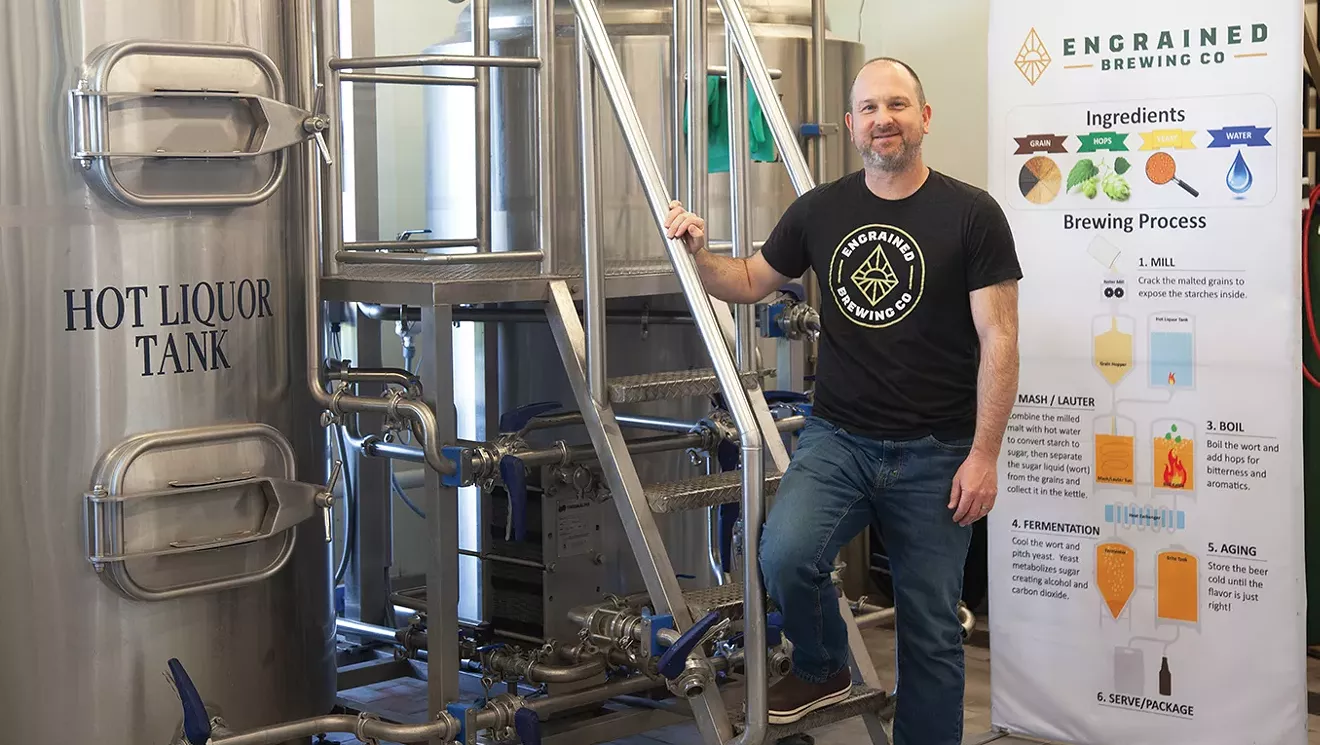
PHOTO BY STEVE HINRICHS
Brent Schwoerer, owner of Engrained Brewing Co., wants to offer his craft beer at the new Scheels Sports Park across the street from his business. But under current Illinois liquor laws, he would be legally prohibited from doing so due to a strict 200-barrel annual limit on self-distribution.
A bill currently being considered by the General Assembly is aimed at making life easier – and more profitable – for small craft beer companies throughout the state. “The majority of Illinois liquor law is pretty much from the 1930s, like Prohibition era,” said Brent Schwoerer, owner, founder and brewmaster at Springfield’s Engrained Brewing Co.
This spring, Schwoerer has plans to open an Engrained “brew deck” at the new Scheels Sports Park, which will be located just across the street from the Engrained restaurant and brewpub, at the MacArthur Boulevard and Interstate 72 interchange. In order to get its products in stores and other retail locations, companies like Engrained can either work with a large distributor or else bring the beer to customers. But under current Illinois liquor laws, Schwoerer would be legally prohibited from carting his own beer across the road to the new sports park due to a strict 200-barrel annual limit on self-distribution.
“We have a lot of excess capacity,” said Schwoerer. “I can do 1,500 barrels out of this facility – I’ll probably do 200 barrels worth of beer just (at Scheels Sports Park).” This potentially means Engrained would be forced to either scale back or even eliminate all other distribution efforts. “Which sucks,” he added.
Schwoerer said that there are 40 breweries in the state of Illinois with the same problem. Many have already reached the 200-barrel cap and are now being financially impacted.
“A lot of these guys don’t have a distributor that will carry them because their numbers are too small and their brand isn’t widely known enough,” he said. “So they’re stuck.”
Turner Haus is a small, Black-owned, family-owned taproom in Chicago. “We make craft beer in honor of the matriarchs of our family who have passed on,” said owner Steve Turner, who estimated that 80% of the distribution chain in Chicago is dominated by the so-called big three of beer brands – Miller, Coors and Anheuser Busch. “We’re talking about 250 craft breweries in the Chicago area all competing for only 20% of the distribution business,” he said.
Turner said that in order for his company to survive and thrive, it will have to go with a self-distribution model and, in turn, be allowed to increase those limits on how much product it can produce and self-distribute.
“It’s not fair to anybody when three companies own 80% of the market share, with 20% being split among 250 smaller companies,” Turner said bluntly.
Enter SB 1622, introduced to the General Assembly this past February by Illinois State Senator Cristina Castro, D-Elgin. The bill is described as an amendment to the Liquor Control Act of 1934 and would “increase the self-distribution limit for class 3 brewers that meet certain requirements” from the current maximum of 6,200 gallons of beer to 77,500 gallons.
“I introduced this measure as part of a broader conversation about alcohol regulations and in an effort to provide clarity and flexibility to nonprofits, craft brewers and retailers,” said Castro in a written statement. “I look forward to continuing discussions with stakeholders about the best ways to protect Illinois consumers and ensure a fair and safe marketplace for brewers, manufactures, retailers, distributors and consumers.”
“In Illinois, we went from somewhere in the neighborhood of 40 breweries to about 300 breweries in the last decade, and self-distribution has a lot to do with that,” said Ray Stout, executive director of the Illinois Craft Brewers Guild. In 2021, the guild passed a bill which included a Class 3 brewer’s license which allows manufacturers to sell directly to retail. “Right now in the market, distributors are not taking on the smaller brands like they were,” Stout explained. “During the pandemic, there were distributors fighting each other to pick up craft beer brands, but not so much anymore.”
Stout said that the idea behind SB 1622 is to create a kind of runway for small, independent breweries to build up distribution networks in hopes of that network being turned over to a wholesaler to continue to grow.
“If the state of Illinois is looking for businesses to relocate here or just to stick around, this is an amazing opportunity,” he said. “It could mean millions and millions of dollars of potential excise taxes that the state would be collecting. We’re talking about jobs and everything else that comes along with it.”
“I’m not going to get in my truck and haul beer from Springfield to Bloomington; that doesn’t make sense for me to drive all the way up there, deliver one keg and drive back,” said Schwoerer. “The point is, just let us have a little bit of autonomy to grow our brand, and then we can help create a pipeline for distribution.”


